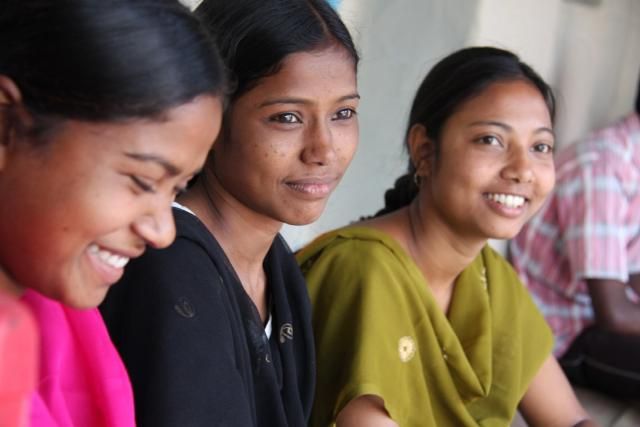Women’s Equality: A Balancing Act

I am currently in India exploring how women’s equality takes shape in our programs, and what we can do to ensure that we are in fact working to reduce inequalities between men and women. One of the main keys to reducing poverty is to ensure that the needs of both women and men are being met. These needs may not be the same, but the end result should be: everyone enjoys the same rights. Just involving women in a program is not enough; one must look deeper into the situation to ensure that the program is actually helping to empower women. Men need to be involved in the process as well. No one should be left behind—rather, everyone should be consulted throughout project design and implementation.
Among the programs we support here in partnership with the Diocese of Durgapur, there are many strong examples of ways to decrease the divide between men and women.
In April 2010, a tornado ripped through the slum community of Kaliagunj and destroyed the dwellings of many families. The diocese, together with Episcopal Relief & Development and the local government, has rebuilt the homes of 17 families. More importantly, the families were legally given the title to the small plots of land where their homes stand—and the diocesan program coordinator insisted that the titles be in the women’s names. Now these women are land owners and cannot be removed from their land; they are certain they have rights and a place to live. The men were supportive of this idea since they knew it would ensure their families a home and security for the future. This is one example of a relief /recovery program that is addressing women’s inequality and involving women in the process.
Another example comes from the Balurghat community, where the women have formed associations that focus on creating economic opportunities through income-generating activities. The diocese has supported them with skills education and they now have successful businesses, such as animal husbandry and producing and selling plates made from leaves. They have their own incomes and decision-making power within the household. The husbands claim they are now afraid of their wives because they have power and are very vocal in the community. In the past, some of the men would use the household money to buy alcohol, but now that the women have income and are involved in deciding how to spend it. They no longer allow that to happen. The family situation has improved and the divide between men and women has decreased.
There are other programs where women’s equality needs to be strengthened. In an agriculture program, for example, the households are supplied with a community tractor in order to increase production. The men plow and during harvest time, the women help—all while still attending to the children and household. Even though household income has increased as a result of the program, the divide has not. The men are the ones who take the produce to market, and keep the profit. They still maintain all decision-making power in how to spend the money, while the women’s status remains the same even though her workload may have increased.
These are a few examples of the kind of women’s issues that come up in our work. What can we do to address them? This is a question we will further explore as we continue our visit this week.
The diocese certainly has a strong commitment to women’s equality and it is important that we bring these experiences to light. I commend the staff for their dedication to these issues and helping to reduce poverty by involving all in the process.
———-
Danielle Tirello Givens is a Program Officer with Episcopal Relief & Development.


